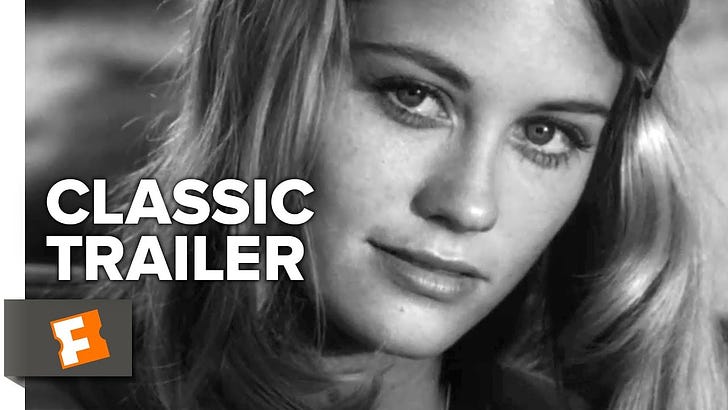My wife and I along with a friend were sitting down for a movie many years ago when our friend confessed that she sometimes cried at the start of a movie. She knew instantly as the music played and the credits rolled by that a tearjerker was fast approaching. She’d bawl her eyes out even before any actor stepped onto the big screen. I got a lot of mileage from this revelation and unashamedly repeated the story many times for cheap laughs.
Watching The Last Picture Show for only the second time, I finally knew what my friend had experienced. I didn’t cry, but I got real sad watching the black and white film as the camera panned along the street of a deserted Texas town, early 1950s. The movie theatre and nondescript shops appear to have been empty for years, jealously guarded by a wind that blows relentlessly.
My spirit felt stretched out along that street, suffering from hypothermia of the soul. Profound sadness goes deeper than tears. Tears will always connect us to others, to this world, a sentimental moment, or those gone from our lives. What I felt at the movie’s opening was a deep lonesomeness, like hearing an ancient spaceship’s audio of the wind scraping the surface of the planet Neptune.
Now for the good news!
Thankfully, people start to slowly populate the town. Highschooler, Sonny Crawford, played by Timothy Bottoms, finds his way to the bleakest pool hall I’ve ever seen. And there, the ball busting begins over last night’s football game. Pool hall owner Sam the Lion, says, “A few football teams have had some luck with tackling. Keeps the other team from scoring quite so often.”
Sonny leaves the pool hall with his good friend Duane, played by Jeff Bridges. Crossing the dusty street, men in passing trucks keep hammering them on their lack of football spirit, specifically tackling. Sonny and Duane go to the diner and even the attractive waitress busts their balls on their lousy performance. My favorite is when a toothpick chewing fella comes over and never says a word. He simply scrutinizes the boys, briefly looks away, and then shakes his head and walks off.
I enjoyed every character who steps onto the stage. Sam the Lion at a fishing hole with Sonny recounts his youth and a wild girl who, for a brief time, was at the center of his life, once betting young Sam to race their horses across the lake. There’s a close up of Sam not talking. The lion in him may be broken, but he still can remember every moment of time with that dream girl. Passion and loss. He says that if this wild thing was to show up again, he could do and would do anything for her.
Sam the Lion has another scene where he’s encouraging Duane and Sonny to go ahead with their impromptu drive to Mexico for a weekend romp. Duane has lost his high school sweetheart—Jacey, played by Cybil Shepard, and Sonny is having an affair with the high school coach’s wife. Both teens need the distraction of a road trip. Sam hands the boys some cash, which they initially refuse, but Sam says its insurance against the unknown. Sam adds, if he were younger, he’d be going with them. A beat later, another quiet moment arrives. The boys and Sam look at each other and don’t say a word. This is a difficult scene for the viewer and the young men. A lot of silent communication commences on the passing of youth, beauty and outrageous adventures.
A few days later the boys drive back into town. Hungover, they stop by the pool hall, but it’s closed, and so is the restaurant. Both businesses are always open, so they wake up a mechanic asleep in his car. He tells them that Sam has died—dropped dead over his snooker table. Both Duane and Sonny enter that twilight of disbelief and just stare into space. Their look says: ‘Sam never died before.’ Death is a new reality, like sex. They’re stung by both. Death is the ultimate banana peel that they slip on and hit the hard ground of life. Often throughout the story they find themselves on their backs, the spirit knocked out of them, staring at the sky above.
Author Larry McMurtry wrote the novel, and also co-wrote the screenplay with the movie’s director, Peter Bogdanovich. The story gives the audience a large spoonful of life, a coming-of-age story unlike anything I’ve ever seen. It shares kinship with the changes that tornadoes and other natural disasters bring to our lives. And it often made me laugh.
I piloted a Boeing Business jet in the early 2000s. We were in Oahu enjoying dinner outside at a nice hotel when we got on the subject of books. I mentioned Larry McMurtry, since I was rushing through his novel Lonesome Dove. The flight attendant told me that her dad had packed the book for a family camping trip when she was still in high school. Once he started reading it aloud, the entire family fell in love with the story. The father tore the book in several sections so they all could start reading and share the cowboy tale.
This vacation anecdote is at the heart of McMurtry’s writing. It’s not only a family sharing a great story, it’s the father ripping up a beloved book, a metaphor for our own hearts torn asunder from the passage of time and the heartache of keen memories, so aptly rendered in McMurtry’s novels.
Saint Augustine wrote, “my heart is restless until it rests in you.” Centuries later it was phrased—'each of us has a God-shaped hole in our hearts that only God can fill.’ I’m sure novelist and unapologetic atheist Larry McMurtry would disagree, but perhaps his characters know better, when they offer those beautiful, forlorn expressions of pained wonder, standing before the great unknown, waiting to be fulfilled.




